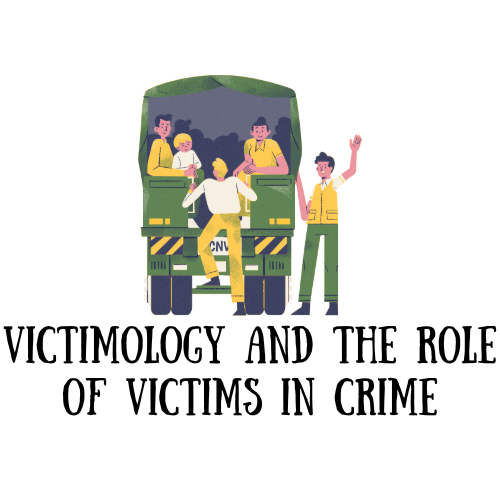Victimology and the Role of Victims in Crime
Victimology and the Role of Victims in Crime
Victimology and the Role of Victims in Crime
Welcome to Law Adhoc Tutorials !
These notes are in easy language and easy to remember.
Law Adhoc Tutorials is an education platform. It helps law students get high quality notes to make their study easier. Law Adhoc Tutorials provides full and completes notes for free for each subjects of law.
Victimology and the Role of Victims in Crime
Victimology and its Concept
Victimology and the Role of Victims in Crime
Victimology and the Role of Victims in Crime
Introduction
The criminal-victim relationship is called “victimology” and it is considered as an integral part of criminology. Recently scholarly attention and involvement have developed about the victim as a constituent of the criminal situation. For scholars of criminology and law, victim is not just a passive object but an active component of his or her own victimisation.
Meaning of Victimology
The term “Victimology” was first used by French lawyer Benjamin Mendelsohn in the year 1947. Victimology is the study of crime victims. It focuses on understanding who victims are and their experiences. This field is closely related to criminology, which looks at crime as a whole. Therefore, victimology is part of the broader issue of crime.
According to Viano, there are several terms which are related to the victims and as a whole to victimology.[3]
- Victimhood- the state of being a victim
- Victimization- the action of victimizing a person
- Victimizer- the offender or the person who victimizes other
As victimology is the relation between the offender and the victim, there can be two major sub-areas in the field of victimology.
- The first is based on the nature of the relationship between the victim and the offender and it relates to the scientific study criminal behavior.
- The other sub-area deals majorly with the role of the system of compensation and restitution to the victim.
Aims of Victimology:
Victimology has three primary aims:
– Analyze the scale of issues faced by victims.
– Explain the causes of victimization.
– Develop measures to reduce victimization.
The Scope of victimology
- Analyzing the factors that lead to victimization and its effects on individuals.
- Developing strategies to prevent victimization and improve support services for victims.
- Advocating for the rights and dignified treatment of victims within the justice system.
- Contributing to laws and policies that address victims’ needs, such as compensation and assistance programs.
- Focusing on helping victims regain control and recover from trauma through counseling and support services.
Victimology and the Role of Victims in Crime
Classification of Victims
Mendelsohn (1976) classifies victims based on their involvement in the crime:
1.Completely Innocent Victim : Individuals like children or the unconscious who bear no blame.
2.Victim with Minor Guilt : Those who may contribute mildly to their victimization, such as individuals who take unnecessary risks.
3.Voluntary Victim : Individuals who engage in high-risk behaviors, including seeking euthanasia or suicide.
4.Victim as Guilty as the Offender: Those who provoke their attackers, sharing responsibility.
5.Victim More Guilty than the Offender: Individuals who induce others to commit crimes against them.
6.Most Guilty Victim: Aggressive victims who harm their attackers in self-defense.
7.Stimulating or Imaginary Victim: Individuals with mental health issues, such as paranoia or hysteria, perceived as victims.
Henting differentiates “society-made” victims, from “born” victims.
- The “female” victim. The female is a symbol of weakness. The male criminals have the benefit of greater physical strength in crimes against women, especially in sexual assault.
- The “young” victim. For Henting, children are physically underdeveloped and psychologically immature. They are weak compared to adults.
- The “old” victim. They are physically and mentally weak. They often fall victims of crimes.
- The “mentally defective and mentally deranged.” They are commonly potential and actual victims of crimes. The insane, the alcoholic, the drug addict, the psychopath and those who suffer from any other mental abnormality can frequently be victims.
- The “minority.” Because of racial, linguistic, religious and caste prejudice they often become victims of powerful groups.
- The “dull normals.” Henting considers them as “born” victims. He thinks the “success” of certain criminals due to the “folly” of their victims. The dull normal can be a moron or an idiot.
- The “depressed.” He is a psychological victim type. He suffers from feelings of inadequacy and hopelessness, apathy and submission. He can be his own victim.
Barnes and Teeters (1951: 595-596) give another category of “negligent or careless” victim type. The negligent and careless attitude of a person towards his belongings makes it easy for an offender to commit a crime.
Problems of victim
- Inability to adequately explain abuse due to the disability.
- Intense feeling of fear, shame, or guilt.
- Dependence on the caregiver/offender.
- Beliefs that they will be blamed.
- Beliefs that the abuser will retaliate or actual threats of further harm.
- Lack of awareness of what constitutes abuse or neglect.
- Lack of knowledge of the protocol for reporting abuse.
- Fear of being left without a home or family.
- Fear of losing custody of children.
- Fear of not being believed.
- Fear that freedom/independence will be lost if abuse is reported.
Victimology and the Role of Victims in Crime
COMPENSATION AND TO THE VICTIM
Compensation for victims is complex. In the past, many states supported it, but today, it is rare for offenders to pay victims or their families. While compensation and restitution are often seen as the same, they differ. Compensation addresses the suffering and losses victims face, showing society’s responsibility for a civil solution.
Essential Elements of an Effective Compensation Scheme for Crime Victims:
- Acknowledge that the government has a duty to protect citizens and provide restitution when that duty fails.
- Ensure that compensation is available to all victims of crime, regardless of circumstances.
- Include compensation for all incurred expenses, such as medical bills and lost wages.
- Implement a swift compensation process to validate victims’ experiences and demonstrate societal commitment to addressing crime impacts.
- Design the scheme to be both compassionate toward victims and efficient in its operations.
Compensation of victims of crime in India
Compensation for victims of crime must be ordered by the court, providing an official process for claims. Victims should have a clearly defined procedure to seek compensation, with legal representation playing a crucial role. The compensation system should cover both material damages, such as medical expenses and lost income, and non-material damages, including pain and mental trauma.
Victims can apply directly for compensation in criminal cases, empowering them in their pursuit of justice. It is essential for their lawyer to advocate for the appropriate compensation to address the victims’ needs effectively.
Victim compensation under The Code of Criminal Procedure, 1973
When an accused is found guilty, the court may impose a fine, which can be partly directed to the victim as compensation.
1 Compensating for Litigation Expenses (Section 357(1)(a))
A crucial form of relief for crime victims is compensation for legal costs. In India, these expenses can be significant, adding to the burden of victims who are already dealing with the aftermath of a crime. The court can award compensation to cover these costs, helping victims pursue justice without the financial strain of legal fees, and allowing them to feel empowered in the process.
2 Compensation for Loss or Injury to be Recovered by the Civil Court
If the compensation sought exceeds the court’s jurisdiction, it can refer the matter to an appropriate civil court. The court will ensure that victims can seek recoverable compensation for losses or injuries caused by the offense.
3 Compensation in Case of Death
In cases of death caused by a crime, the victim’s family is entitled to compensation for mental trauma, medical expenses, and last rites, particularly if the victim was the sole breadwinner. The court allows families to recover damages from the convicted individual.
4 Compensation for Victims of Crimes like Theft and Cheating
For crimes like theft and cheating, the court may seek to recover stolen goods. If recovery isn’t feasible, it will order compensation for their value.
The case of D.K. Basu vs. State of Bihar (1997) is a significant judgment concerning victimology and police accountability in India. It arose from the unlawful detention and death of D.K. Basu due to alleged police torture. The Supreme Court condemned custodial violence and laid down guidelines to protect individual rights, including:
- Recording arrests in a register.
- Informing detainees of their right to legal counsel.
- Notifying family members of the arrest. 4. Conducting regular medical checks on detainees.
Victimology and the Role of Victims in Crime
Penology and Victimology Notes : https://lawadhoctutorials.com/penology-and-victimology-notes/
Penology and Victimology Notes PDF : https://lawadhoctutorials.com/penology-and-victimology-notes-pdf/
Victimology and the Role of Victims in Crime
Education of Prisoners Notes : https://lawadhoctutorials.com/education-of-prisoners/
Vocational Training for Prisoners notes : https://lawadhoctutorials.com/vocational-training-for-prisoners-in-india/
Victimology and the Role of Victims in Crime
Rights and Duties of Prisoners notes :- https://lawadhoctutorials.com/rights-and-duties-of-prisoners/
Model Prison Act Notes : https://lawadhoctutorials.com/model-prisons-act-2003/
Victimology and the Role of Victims in Crime
All subjects law notes : https://lawadhoctutorials.com/subject/
All subjects law notes in pdf : https://lawadhoctutorials.com/notespdf/
Victimology and the Role of Victims in Crime
Law of torts lecture link on YouTube: https://youtu.be/fRx-i5fk3jo?si=QPnyduoa3IeZoI5W
Free and easy to access law notes. The law notes are available for all law subjects. Please check the below-mentioned list for complete law notes.
Victimology and the Role of Victims in Crime
Click on the specific subject to view its notes.



